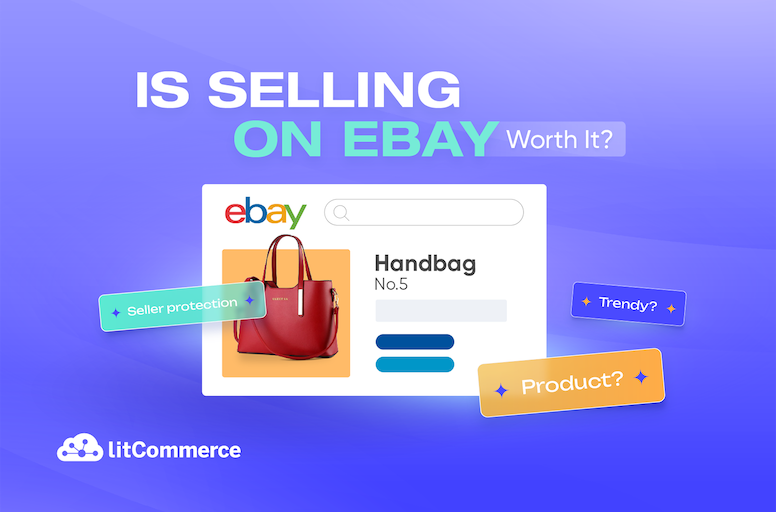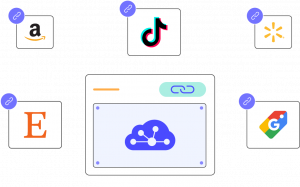eBay is a popular online marketplace that brings together buyers and sellers. Originally based on auctions, eBay is still a powerful eCommerce website, second only to Amazon in size. Is selling on eBay worth it today? Is eBay the best place to sell? With so many new online selling platforms, does eBay make good use of time and effort?
Let’s read this article and review some of the pros and cons to see: Is selling stuff on eBay worth it?
Expand to eBay Without the Headache
LitCommerce simplifies selling on eBay with bulk listing, auto-sync, and one-click order management—all from your online store.
Pros of Selling on eBay
In this article, we will help find the answer to: Is it worth selling on eBay? To get started, let’s consider the pros and cons of being an eBay seller. In this section, we will discuss the potential benefits of an eBay store, as well as its drawbacks, providing detailed explanations. Keep reading to see if selling on eBay is worth it.
Undoubtedly, selling on eBay offers a huge boost to your business. Here are the reasons why you should open an eBay store:
- Vast customer base
- Sales of anything
- Secure transactions
- Quick eBay customer service
- Buyer-protection programs
- Auctions selling models
Read on to learn more about each benefit right below!
1. Vast customer base
Is selling on eBay worth it? Absolutely! First up, eBay’s global reach is incredible. According to Yaguara’s research in 2025, eBay brings together 134 million active buyers and over 18 million sellers from all over 190 markets worldwide, making it easy to find a diverse audience for your products.
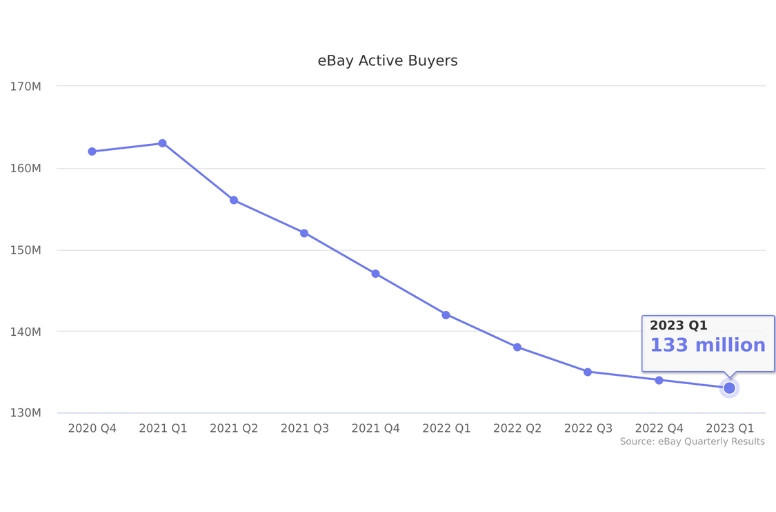
Another big reason eBay is so popular is its massive product selection. With more than 2.1–2.3 billion live listings, eBay offers a wide range of products, including electronics, fashion, collectibles, and second-hand goods. So, no matter what you’re selling, there’s a space for it.
You might be wondering, is people still use eBay? Yes, absolutely! Based on the Yaguara statistic, over half of eBay’s traffic comes from mobile users, and nearly 75% of them are between 18 and 34 years old. So, it’s super easy to shop on the go, anytime, anywhere.
eBay also boasts a strong customer retention rate of over 83%, indicating that people continue to come back for more. Many buyers also appreciate the platform for its sustainability, with 86% stating that they prefer buying pre-owned items to help reduce waste.
All these reasons make eBay a fantastic place for selling your products in 2026. So, if you’re asking yourself, is selling on eBay worth it?—the answer is yes!
3. Sales of anything
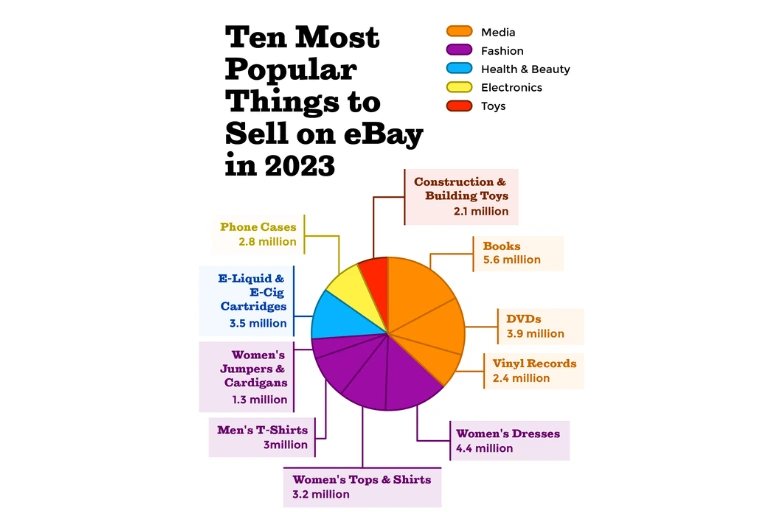
(Source: wholesaleclearence)
Being competitive on eBay doesn’t demand having flashy products. In fact, many individuals sustain themselves by selling items from their homes they no longer need. This is advantageous when it comes to: Is selling on eBay worth it? This is because it doesn’t require operating like a big business.
Starting on eBay may need less than $100, sometimes just a few dollars for fees and shipping. Those interested in selling on eBay can give it a try with reasonable risk. Simply sign up, sell unused items, and see if the eBay seller’s life suits you. If not, you can explore other options, but if it does, you’ll already have earned some money to invest.
However, that does not mean eBay is just a platform for second-hand items, like old clothes sold through bidding wars. In reality, eBay predominantly showcases new products. Most listings now feature a ‘Buy It Now’ option, enabling immediate purchases without the need for bidding.
If you want to sell new items, eBay also is a good option. You can also have eBay integration with other platforms and marketplaces to scale your business by using the Litcommerce tool.
4. Secure transactions
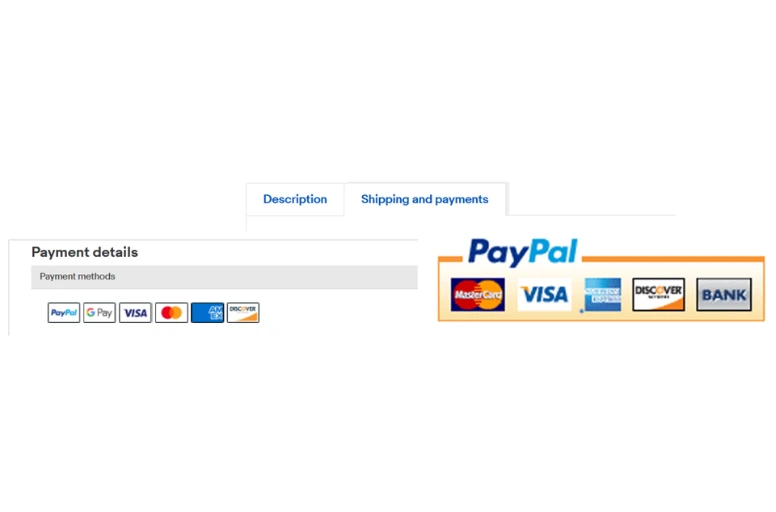
Is it safe to sell on eBay? eBay prioritizes user security and has implemented various features and policies to ensure a safe transaction experience. One major focus is on providing a secure and encrypted platform for all financial transactions conducted on eBay.
This means that when users make payments, sensitive financial data like credit card details or PayPal accounts is protected using encryption technology.
The Verified Rights Owner (VeRO) Program is another crucial security measure eBay employs. This program enables trademark and copyright owners to report any listings that infringe upon their intellectual property rights. eBay takes these reports seriously and swiftly removes infringing listings, maintaining a secure environment for both buyers and sellers.
To further ensure security, eBay offers a Buyer Protection policy, providing buyers with confidence while shopping. Additionally, eBay extends security measures to sellers, offering seller protection policies that guard against fraudulent claims or unauthorized transactions.
5. Seller-protection programs
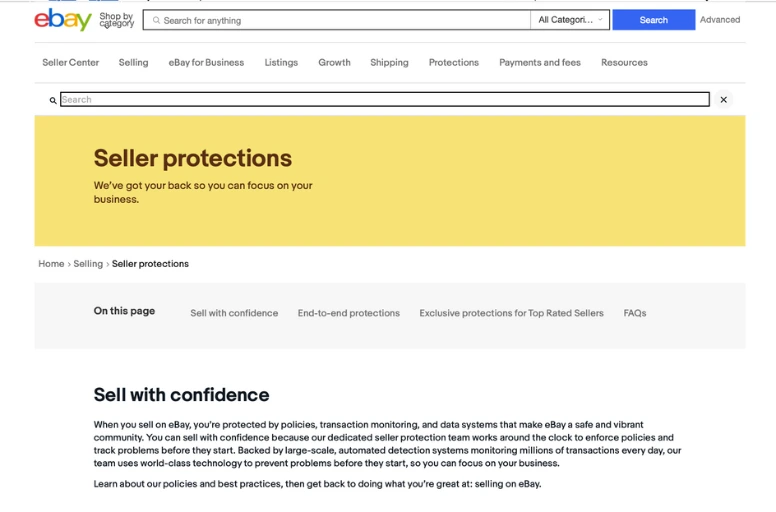
Having an eBay store brings various advantages, notably the seller protection program from eBay. This program is hardly found in other top marketplaces like Amazon, making it worth selling if you wonder: Is selling on eBay worth it? eBay aims to protect sellers from certain buyer behaviors and uncontrollable situations when operating a store on eBay.
Regarding abusive buyer conduct, eBay intervenes by taking diverse protective measures for sellers found in violation of the abusive buyer policy. Actions range from removing negative feedback and defects to even suspending the buyer’s account. Or if a buyer retracts their purchase after an auction concludes, sellers can file an unpaid item report. The seller will then get a final value fee credit.
Additionally, sellers receive eBay’s protection for situations beyond their control, like weather-related issues or disruptions caused by carriers. In instances where severe weather or carrier-related incidents lead to late deliveries or cancellation of a shipment, eBay adjusts late shipment rates and removes canceled transaction defects and feedback.
6. Auctions selling models
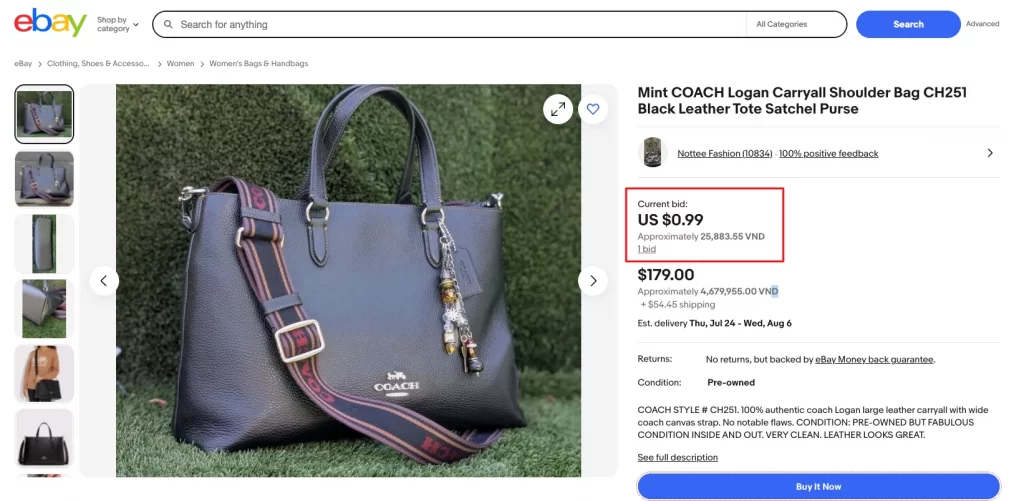
Something you don’t see commonly on other top marketplaces for selling products is the auction selling models. If you ask: Is eBay worth it to start selling? This selling model may be a point to consider. Here are some main benefits of using auctions on eBay.
- Bidding on eBay can elevate selling prices as the competitive nature of auctions sparks bidding wars, leading to higher sales. The auction format often attracts more buyers, fostering excitement and driving up prices significantly.
- Items on auction tend to sell faster than those with fixed prices because of the time limit, prompting quicker purchases. This urgency encourages buyers to act swiftly compared to fixed-price listings.
- Auctions are ideal for unique or rare items, like collectibles or specialty items, such as coin auctions on eBay. Enthusiasts and collectors engage in bidding wars, elevating the value of these items and creating a fair and competitive selling atmosphere.
From Store to eBay—Get Listed in Minute
LitCommerce helps you list multiple products to eBay in bulk and keeps everything synced so your data is always up to date.
Cons of Selling on eBay
Besides the benefits that eBay brings to sellers, there are some drawbacks that discourage them from starting a business on this marketplace. Such drawbacks could be the reason why more sellers are looking for an eBay alternative. They include:
- Rule and policy restrictions
- Complicated selling process
- Various seller fees and commissions
- Much competition in some niches
- Shipping hurdles
Let’s get into each!
1. Rule and policy restrictions
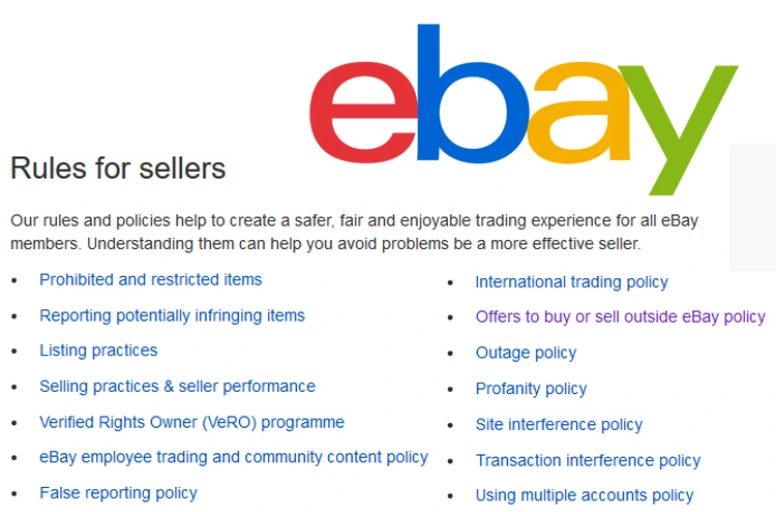
The restrictions of policy may be the downside when it comes to: Is selling on eBay worth it? When selling on eBay, you must follow a set of restricted policies.
The first one is the return policies, in which sellers have less control over some business areas. Handling issues such as returns, refunds, and customer service requires strict adherence to eBay’s established rules.
Essentially, you are operating in their online marketplace, so you must adhere to their rules. However, remember these rules aim to protect eBay, sellers, and buyers.
Plus, it’s important to understand that marketplaces prioritize their own interests over sellers’. eBay often prioritizes the listed items rather than the individual sellers. This includes limitations on branding within listings and various communication methods. Additionally, eBay retains the authority to remove listings at their discretion.
The best approach to deal with this is thoroughly understanding all policies, terms, and conditions. Then, decide how to run your business as closely as possible to your preferences while still complying with requirements. Operating in someone else’s established online space means adjusting to their frameworks and processes to some degree.
2. Complicated selling process
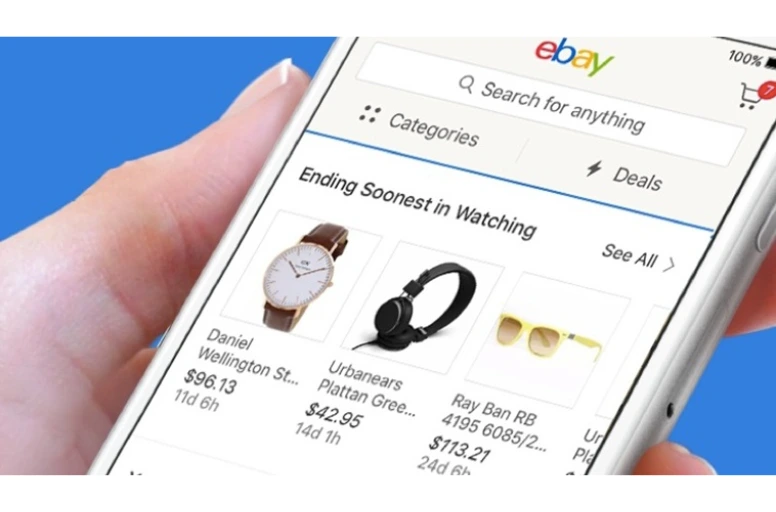
Selling on eBay in 2026 offers significant opportunities, but it also comes with its challenges. Is it hard to sell on eBay? That depends on your strategies, experience, and expectations.
Starting on eBay is simple, especially if you’re familiar with online registration and eCommerce basics. Here’s how it works:
- The first step is registering for an eBay account, which involves providing your name, email, and creating a password. You can choose between a personal or business account depending on your needs.
- eBay will need to verify your identity through their Know Your Customer (KYC) process. You’ll link a bank account (via Payoneer or local banks) and provide valid identification. This step is typically quick, but it can take a few days depending on your details.
- After account registration, you’ll set up your seller profile. This includes adding payment methods and configuring your preferences, which is an easy but crucial part of ensuring smooth transactions.
While the process is user-friendly, some new sellers might run into a few bumps along the way:
- Verification delays: Sometimes, the identity verification step can take longer than expected, especially if there’s a mismatch in your provided information.
- Initial selling limits: As a new seller, you might face limits on how many items you can list at first (usually about 5 per month). These limits increase as you build a positive track record.
- Learning curve: It may take some time to fully understand eBay’s listing optimization, shipping processes, and customer service expectations. But there are plenty of guides and community resources available to help you along the way.
Searching for a detailed guide of steps to sell on eBay? Look no further because LitCommerce has got you right here!
3. Various seller fees and commissions
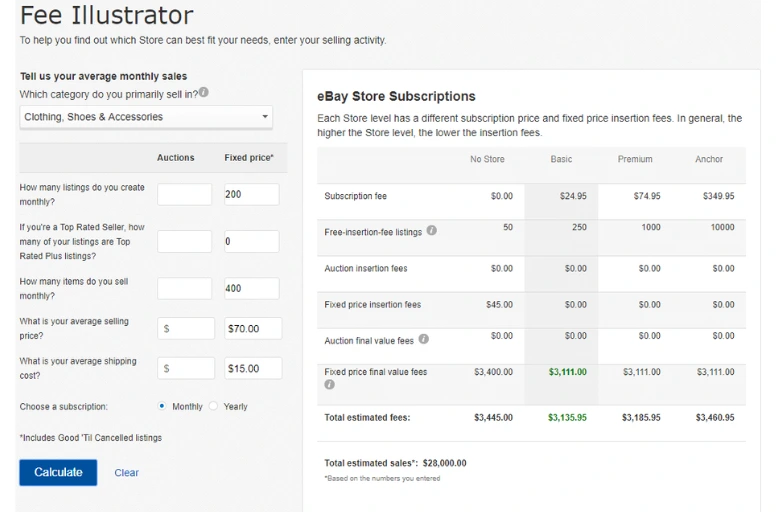
The less appealing aspect is selling fees on eBay. This involves various fees for sellers, which are deducted from the sales made on the platform. This is one of the main factors that discourage users from selling on eBay if asked: Is selling on eBay worth it? Despite this, eBay fees are comparatively lower than those of other top marketplaces like Amazon. That’s why eBay’s second-world biggest marketplace has over 130 million active users and 1.5 billion active listings.
Here’s a breakdown of the eBay seller fees:
- Insertion fees:
- Standard listings: First 250 listings per month are free; after that, it’s $0.35 per listing.
- Store plans: Basic stores get 250 free listings, Premium stores get 1,000 free.
- Special cases: Additional fees for listing in multiple categories or relisting.
- Final value fees
- Standard rate: eBay takes 12%–15% of the total sale price (including shipping).
- Fixed fee: $0.30 for sales under $10, $0.40 for over $10.
- Increased fees: Most categories saw a 0.35% fee increase in February 2025.
- Additional fees
- Performance penalty: Sellers rated “Below Standard” pay an extra 6% on sales.
- International sales: Fees up to 1.7% for cross-border sales.
- Currency conversion: A fee if the sale currency differs from your account’s currency.
- Optional fees
- Promoted listings: Set your own ad rate (1%–20%) for boosted visibility, charged only if the item sells.
- Listing enhancements: Pay for bold titles, subtitles, or international visibility.
- Payment processing: Payment processing is included in the final value fee, so there are no separate third-party fees.
eBay’s seller fees can be a bit steep and complicated, especially when you factor in all the different charges like insertion fees, final value fees, and additional penalties. For low-margin sellers or those just starting out, it might feel like a lot.
The fees can be manageable if you’re strategic with your listings and optimize your performance, but they can definitely cut into profits if you’re not careful.
4. Much competition in some niches
As with any marketplace, eBay features competition from other sellers. With millions of active buyers, sellers likely face stiff competition for popular niches, such as:
- Electronics & Tablets/Desktop
- Clothing & Shoes
- Fitness Equipment & Gear
- Furniture & Home Decor
- Jewelry & Watches
Before listing saturated products, research competitors. This may lead you to avoid certain items entirely or devise tactics setting your listings apart from crowded listings. If you want to save time to find the best products to sell, check the list of what sells best on eBay.
Is selling on eBay worth it if you offer popular products in these niches? You might need to adjust your price and provide a superior deal to beat your competitors.
5. Shipping hurdles
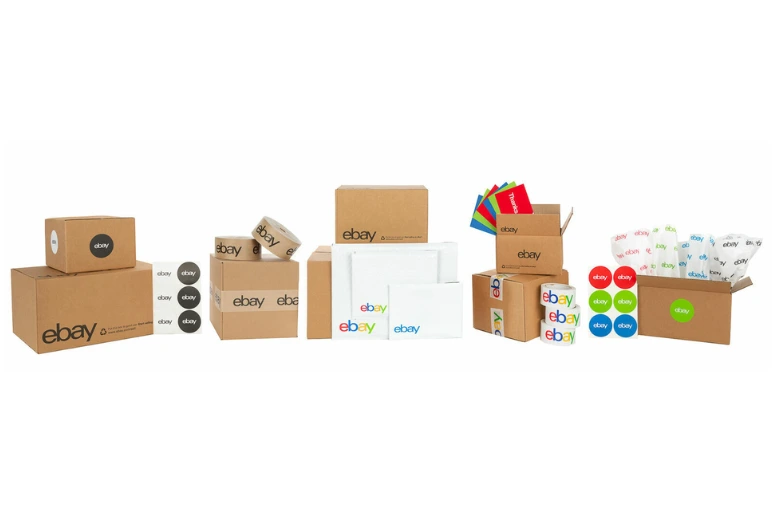
Is eBay good for selling globally? Yes, it is. But shipping on eBay can be a real challenge due to its wide-reaching marketplace. Sellers encounter various shipping obstacles, handling everything from small, light items to large, fragile ones. This variety makes it tough to create standardized shipping methods.
Moreover, eBay’s global presence means sellers often deal with international buyers, leading to complex shipping regulations, customs processes, and potentially longer delivery times. This international aspect introduces varying shipping rates, import duties, and taxes, adding layers of complexity absent in domestic sales.
Sellers often vie on pricing, sometimes offering free or low-cost shipping to entice buyers. However, balancing competitive pricing with actual shipping expenses can dent profit margins. Thus, it’s vital for sellers to precisely calculate shipping costs and pick the best shipping options for profitability.
Is eBay Still a Good Place to Sell?
Is selling on eBay worth it, even for now? While eBay has changed over time, it remains a well-liked choice selling various goods. The platform operates in a user-friendly manner and provides seller protections and a large user base, making it a good option for e-sellers. However, there are some reviews that show that selling on eBay is no longer worth it. Keep reading to learn more.
Real reviews from sellers
Is eBay still popular? There’s been a decline in eBay users recently, especially sellers who stated that eBay fees and taxes are too high and hinder them from selling on the platform:
“The fees have made me stop selling. They used to take 5–6 percent of the deal, and I could abide by that. Now with PayPal and eBay fees, they take 13.2 percent. There isn’t much profit left at these confiscatory rates. “
“I no longer sell on eBay due to their ever-increasing list of fees and charges. The most outrageous is that the seller fee is a percentage based on the total sale price, meaning you pay a fee for the shipping…”
“eBay has definitely seen a decline in popularity. In my own experience as a former customer, I found it no longer worth it when they started charging buyers taxes.”
Plus, some users thought eBay had changed its focus from auction sites to “Buy it now” marketplaces like other counterparts. That makes it less lucrative for small businesses.
“It is, but from a bidding focussed platform, it is now a marketplace where direct sales happen, less frustration, and you get what you want immediately, rather than playing the game of bidding and waking up at odd hours to bid at the last moment.”
“Having been an eBay seller for 19 years, I honestly think eBay has changed their focus- they want to be a big box vendor and not be America’s garage sale anymore. They no longer want nor care about small sellers.”
However, with its large user base with over 130 million active users, eBay is still a good place to do business.
“eBay is fantastic. For sure, you have exposure to millions of potential buyers and can make money.”
“I tried eBay, OfferUp, and Shopify. EBay turned out the best. I started selling cheap items that gave me positive reviews so I could gain trust for more expensive items.”
“As of 2022, there are 159 million active users, and over 19 million sellers have accounts on eBay. Whether you are looking to start your own online business or simply expand your Amazon business into open fields, eBay is a great place to start.”
Many sellers join eBay since they have more choices to sell:
“Yes, still #1 for online selling. Amazon is big, but they restrict what can be sold, especially used items.”
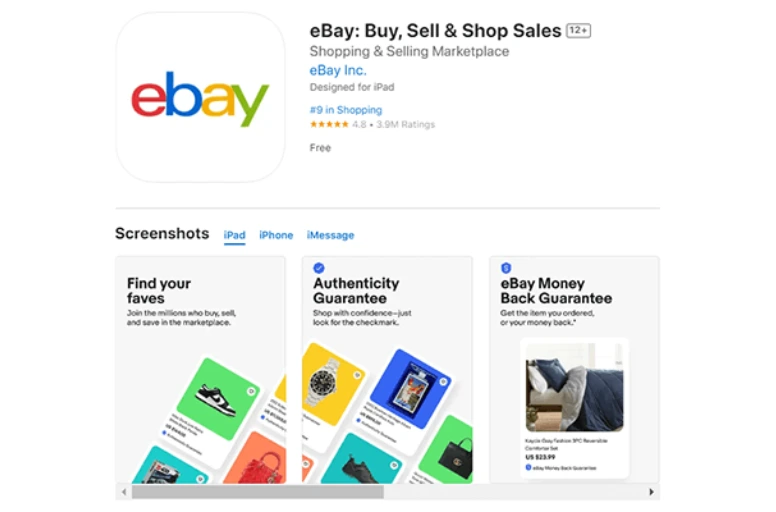
Who can benefit from eBay?
Is selling on eBay worth it for all sellers? Considering these viewpoints, we conclude that eBay might be more suitable for:
- Small businesses and entrepreneurs looking for low upfront costs can benefit from eBay’s global reach.
- Side hustlers and accidental entrepreneurs can sell unused items or test new products. eBay makes it easy with minimal risk.
- Large-scale sellers and high-volume businesses can take advantage of eBay’s business accounts. These offer higher selling limits and more features for bulk sales.
- Manufacturers and brand owners can sell directly to consumers. This cuts out traditional retail channels and boosts margins.
- Resellers and liquidators who need to offload inventory will find eBay ideal. It has a large audience for bulk and liquidation sales.
- Hobbyists and collectors can sell rare or vintage items. eBay’s auction and fixed-price formats are perfect for niche markets.
However, it might not be ideal for sellers who:
- Rely on smaller profit margins due to increased fees.
- Look for a platform more focused on supporting small-scale, individual sellers.
Is It Worth Selling on eBay: FAQs
The answer is yes. eBay remains very popular for consumers to both buy and sell items. Around 130 million monthly users interact on the website. This level of activity exceeds what many retailers experience. So if you ask: Is selling on eBay worth it? Sure, it is with its large user base. Selling on eBay provides protection through various policies, transaction monitoring, and data tools that help establish it as a secure and active marketplace. You can sell with assurance because eBay has a dedicated team focused on enforcing guidelines and proactively addressing potential issues. Profitability from eBay sales can differ significantly based on things like products, quantity, pricing approach, and level of competition. Occasional sellers may gain a few hundred dollars per month, whereas large-scale sellers or those with coveted or scarce goods could net thousands or even tens of thousands monthly. Factors like demand, supply, and marketing tactics all impact financial outcomes making eBay profits vary widely by individual situation. Is selling on eBay worth it if you sell clothes on it? Absolutely, with dedication, selling clothes on eBay can be a profitable endeavor, even a means of earning a living! Whether they’re your own, thrifted, from garage sales, or even from major retailers, all kinds of clothes can be sold on eBay, turning into profits for you! So if you wonder: Is it worth selling used clothes on eBay? Sure, you can absolutely sell used apparel on eBay. eBay’s revenue from a sale varies based on the item’s final price, its category, and any applicable additional fees. Typically, eBay deducts around 10% to 15.55% from the final selling price as fees. For international sales or when utilizing promoted listings, this percentage can go up.
Is It Worth It to Sell on eBay? Final Words
Is selling on eBay worth it, till now? As we’ve learned, eBay is still a great place to start your eCommerce store or just to offload some great items you found at the local flea market if you want to start selling small.
The key to a successful eBay store is researching the intended market and choosing the right tools. If you want eBay integration with other marketplaces or platforms to scale your business, LitCommerce is exactly what you need. Contact us now for more support and details.
Do you need more articles like this? Visit our Blog to discover more!

